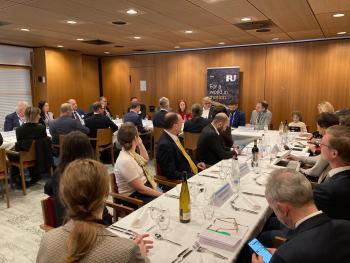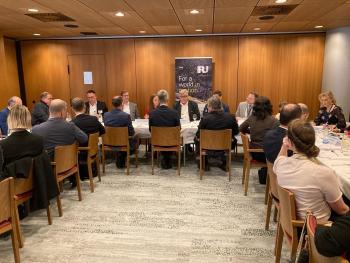IRU and Lease Europe brought together EU lawmakers and industry leaders in Strasbourg today to chart a realistic path forward to green corporate fleets.
With the European Commission preparing to roll out its Greening Corporate Fleets Initiative, EU lawmakers, industry leaders and transport operators met in Strasbourg this week to discuss how to make the shift to zero-emission fleets workable on the ground.
The high-level debate, organised by IRU and Lease Europe, was hosted by Members of the European Parliament Kosma Złotowski (ECR), Jan-Christoph Oetjen (Renew Europe), and Andrey Novakov (EPP).
The debate focused on ensuring that any upcoming legislation supports fleet operators through incentives, infrastructure, and technology options, rather than rigid quotas. Participants warned that without enabling conditions, binding targets could slow progress instead of speeding it up.
IRU EU Director Raluca Marian said, “The EU is at a pivotal point. We all agree on the need to decarbonise, but will the EU move towards a planned economy — regulating purchases through compulsory mandates — even before there is proof that markets, in all their diversity, will naturally pick up?”
Co-treasurer and Member of the Committee on Transport and Tourism Kosma Złotowski said, “Transport, alongside the energy sector, is paying the highest price for the EU's ambitious but time-wise unrealistic climate policy objectives.”
“Mandatory purchasing targets for company fleets are a huge mistake. We are meeting today to build a group of MEPs who understand that such administrative intervention and penalties severely damage competitiveness and growth.”
From commitment to capability
Operators from across Europe shared concrete examples of their efforts to decarbonise, rolling out electric taxis and vans in low-emission zones, adapting depots for high-power truck charging, and piloting electric coaches on interurban routes.
However, they also raised persistent challenges that continue to hinder scaling-up: inadequate charging infrastructure, high vehicle costs and limited model availability, particularly for long-haul and coach operations.
Across the board, the message was clear: infrastructure must keep pace with ambition.

Incentives over obligations
“Whether targets are placed on fleet owners, transport operators or shippers, they will create the same harm: distorting markets and destroying business viability. Obligations on shippers, for example, will cascade down the chain, pressuring large operators first, then the smaller subcontractors.
“Pretending that only large companies will bear the burden is an illusion in markets deeply rooted in SME subcontracting. Incentives, not obligations, are the way to drive meaningful and sustainable change” added Raluca Marian.
One of the key points of debate was the European Commission’s consideration of binding targets for large fleets under the forthcoming proposal. Industry representatives cautioned against a rigid, top-down approach that risks outpacing the market’s ability to deliver.
While operators are committed to decarbonisation, they warned that mandatory quotas without the right conditions, affordable vehicles, widespread infrastructure and technology choice, could stall progress rather than accelerate it.
Instead, participants urged the Commission to prioritise enabling measures. These include targeted incentives such as purchase grants, tax breaks, toll exemptions, and funding for depot and corridor charging infrastructure.
Such tools, they argued, are essential to bridge the economic and operational gap between zero-emission and conventional fleets, particularly for sectors operating on thin margins and in complex environments.
Member of the Committee on Transport and Tourism Andrey Novakov said, “We need a better understanding of the industry and a dose of common sense. Businesses know how to run their companies. We shouldn’t set unrealistic goals for customers who are not ready. Incentives are better than sanctions, and we must avoid risky manoeuvres.
“Companies should not be driven out of the EU by impractical policies.”
Flexibility and technology neutrality are key
Participants also called for the Commission to preserve a technology-neutral framework. Given the diversity of fleet types and operating conditions, electric, hydrogen and renewable fuel solutions must all remain on the table.
Member of the Committee on Transport and Tourism Jan-Christoph Oetjen said, “We hear regularly from logistics companies, without charging points, that there’s no business case for zero-emission trucks. Technology neutrality is essential; the goal is carbon neutrality. We should bring forward the revision of CO₂ standards for heavy duty vehicles and focus on real use cases.
“Coaches also face specific challenges that need separate attention. There’s no need for extra regulation on greening corporate fleets”
The debate comes at a pivotal time, as the Commission prepares to publish its proposal later this year under the broader EU Automotive Strategy.
IRU and Lease Europe reiterated their commitment to work with EU institutions to ensure that political ambitions reflect operational realities and help Europe’s fleet sector deliver climate goals fairly, effectively and at scale.

